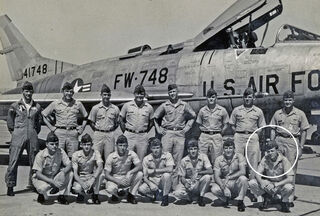Hormones
The Right Stuff Is Not Just For Test Pilots. We Need It Too.
When alarmed, we need to automatically quiet it down so we can think clearly.
Posted October 2, 2020 Reviewed by Kaja Perina
It's been a long time since Tom Wolfe's book about test pilots and astronauts, "The Right Stuff," came out, but its premise is unchanged. People who face life and death challenges successfully must remain cool, calm, and collected when in trouble in order to think their way out of it.
When I was a fighter pilot, after a crash was reported, there were always discussions about what the pilot did right and did wrong. If he got out of it, the discussion was about what he did right. We mentally filed that information away to be used if we became caught in the same situations. If the pilot didn't survive, we tried to figure out what he might have done differently. Did he do something to get him into a bad situation? Did he make the wrong move to correct what went wrong? Did he wait too long to bail out? We filed that away, too.

The F-100 was the Air Force's first supersonic fighter. When it was designed, supersonic flight was not well-understood. Thus, it had some treacherous flight characteristics. I finished F-100 training with a dozen other pilots in my class. A year-and-a-half later, there were 9 of us still alive. One of those who wasn't alive was my friend, Bob. During training, Bob spent his spare time watching cartoons. I spent most of my spare time fretting about past accidents, and figuring out what I would do if something similar went wrong.
One day as Bob was returning to the base to land, his cockpit air conditioning malfunctioned. It started pouring extremely hot air into the cockpit. The procedure for handling that is well-established. You first try to reset the temperature. But if that doesn't immediately reduce the inflow of hot air, you pull a handle that blasts the cockpit's canopy off the plane.
Bob didn't do that. He tried to land the plane with the canopy still on the plane and hot air coming into the cockpit. As he neared the field, he passed out. We don't know how long he was unconscious. But he did come back to, and was able to land.
I was furious with him. Why did he do such a dumb thing, risking his own life - and his plane - to save the Air Force the expense of replacing the canopy? He brushed it off as no big deal. Then a few weeks later, his engine quit when flying over water. He had no choice. He bailed out. But in the water, he got tangled up in his parachute and drowned before a rescue helicopter could reach him.
Fast forward four years. As I was flying an F-105, the air conditioning system started blowing hot air into the cockpit. I reset the temperature. That didn't help. I had already decided if I had an air conditioning failure, I was not going to take a chance of passing out. So I jettisoned the canopy off the plane.
But back to the right stuff. When stress hormones are released in an emergency, they cause a feeling of alarm. That's good. Alarm gets our attention. But - and here is where the right stuff comes in - to be able to think our way out of an emergency situation, we need our high-level thinking to kick in. But it can’t function until the feeling of alarm goes away. There are two ways for alarm to go away:
- Wait 90 seconds for the stress hormones that are causing alarm to burn off.
- Override the stress hormones causing alarm by activating the parasympathetic nervous system.
Ninety seconds is too long a time to wait to figure out what to do in an emergency. This is where the right stuff comes in. It is a pre-established mental program that responds to alarm: it activates the parasympathetic system, causing it to override the stress hormones, silence the alarm, and let us think clearly.
I wonder about my classmate’s parasympathetic system. I wonder if he watched cartoons instead of pondering options in an emergency because his parasympathetic didn't calm him when thinking about an emergency. If his only way to think clearly in an emergency was to wait 90 seconds for the stress hormones to burn off, no wonder he got into trouble he couldn't get out of.
Someone posted this on Quora: "It's not a panic attack, but it's a small blip, a glimmer of anxiety or fear, for a few seconds at most. What am I experiencing?
I replied that her mind is working exactly as it is supposed to. Alarm grabbed her attention when her amygdala sensed possible danger. Her parasympathetic nervous system quieted the alarm so quickly that all she experienced was “a blip.”
So what about you? What happens when you think of flying? Do you feel alarmed? If so, that's fine. But how long does the alarm last? If your feeling of alarm does not immediately down-regulate to curiosity, you need to do some work. You need to train your unconscious procedural memory to automatically activate your parasympathetic system as soon as you feel alarmed. This is so you can think clearly and deal with what is going on to the best of your ability, rather than to freeze, expect the worst, or panic.




